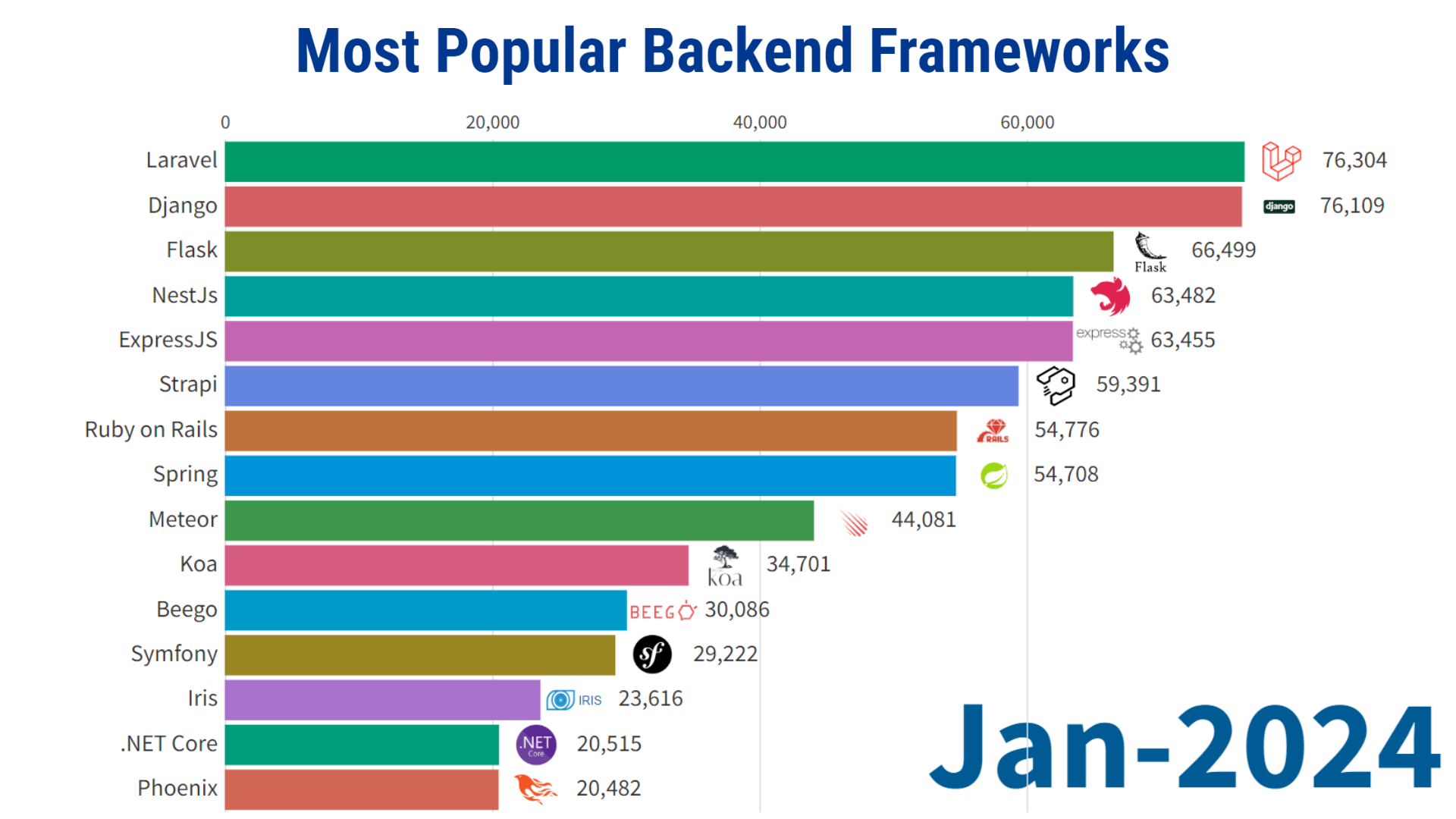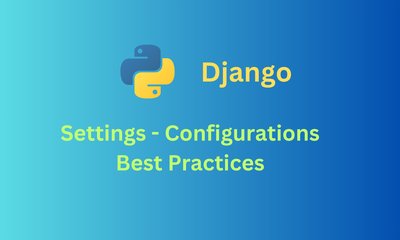15 Kỹ Năng Hàng Đầu Mà Mọi Nhà Phát Triển Django Nên Có Năm 2024
By JoeVu, at: 14:42 Ngày 10 tháng 10 năm 2024
Thời gian đọc ước tính: __READING_TIME__ phút


Khung Django vẫn là một thế lực mạnh mẽ trong phát triển web, cho phép tạo ra các ứng dụng an toàn, khả năng mở rộng và hiệu quả. Khi bức tranh công nghệ phát triển, các nhà phát triển phải trau dồi kỹ năng của mình để luôn dẫn đầu. Dưới đây là 10 kỹ năng hàng đầu mà mọi nhà phát triển Django nên nắm vững trong năm 2024.
1. Thành thạo Python
Django được xây dựng trên Python, điều này làm cho việc nắm vững cú pháp, cấu trúc dữ liệu, lập trình hướng đối tượng và các tính năng nâng cao của Python như decorator và context manager là điều cần thiết. Hiểu sâu về Python đảm bảo việc sử dụng hiệu quả các khả năng của Django.
Tự hỏi bản thân:
-
Tôi có hiểu các tính năng nâng cao của Python như decorator và context manager không?
-
Tôi có thể viết mã Python sạch và hiệu quả không?
-
Tôi có thành thạo các thư viện tích hợp sẵn của Python như itertools và functools không?
-
Tôi có thể xử lý ngoại lệ hiệu quả trong Python không?
-
Tôi có hiểu về quản lý bộ nhớ và hệ thống thu gom rác của Python không?
2. Hiểu sâu sắc về Khung Django
Để trở thành một nhà phát triển Django xuất sắc, việc nắm vững các tính năng cốt lõi của khung là điều không thể thương lượng. Các lĩnh vực chính bao gồm:
-
Models, Views và Templates (kiến trúc MVT).
-
Django ORM để tương tác với cơ sở dữ liệu liền mạch.
-
Định tuyến URL, middleware và các công cụ tích hợp sẵn như Django Admin và forms.
-
UnitTest, pytest trong Django
-
Bộ nhớ đệm Django
-
Cơ chế không đồng bộ của Django (được giới thiệu tháng 8 năm 2020 - Django 3.1)
Tự hỏi bản thân:
-
Tôi có thể sử dụng ORM của Django hiệu quả cho các truy vấn phức tạp không?
-
Tôi có hiểu rõ kiến trúc MVT của Django không?
-
Tôi có thoải mái khi sử dụng middleware của Django cho các chức năng tùy chỉnh không?
-
Tôi có thể tạo và tùy chỉnh các form trong Django không?
-
Tôi có biết cách sử dụng bảng quản trị tích hợp sẵn của Django để quản lý hiệu quả không?
3. Quen thuộc với các Công nghệ Frontend
Mặc dù Django là một khung backend, nhưng việc hiểu biết cơ bản về HTML, CSS và JavaScript là rất quan trọng. Kinh nghiệm với các khung frontend hiện đại như React, Vue.js, hoặc Angular cũng có thể tăng thêm giá trị cho các dự án phát triển full-stack.
Tự hỏi bản thân:
-
Tôi có thể tạo các thiết kế đáp ứng và dễ tiếp cận bằng HTML và CSS không?
-
Tôi có hiểu các nguyên tắc cơ bản của JavaScript, bao gồm thao tác DOM không?
-
Tôi có quen thuộc với việc tích hợp Django với một khung frontend như React hoặc Vue.js không?
-
Tôi có thể tối ưu hóa hiệu suất frontend, bao gồm giảm thời gian tải không?
-
Tôi có biết cách sử dụng công cụ dành cho nhà phát triển trình duyệt để gỡ lỗi và nâng cao mã frontend không?
4. Chuyên môn Quản lý Cơ sở dữ liệu
Các nhà phát triển Django phải thành thạo trong việc làm việc với các cơ sở dữ liệu quan hệ như PostgreSQL, MySQL và SQLite. Kỹ năng thiết kế lược đồ cơ sở dữ liệu hiệu quả, viết các truy vấn được tối ưu hóa và sử dụng Django ORM hiệu quả là điều cần thiết.
Tự hỏi bản thân:
-
Tôi có thể thiết kế các lược đồ cơ sở dữ liệu chuẩn hóa không?
-
Tôi có hiểu về lập chỉ mục và tác động của nó đến hiệu suất truy vấn không?
-
Tôi có thành thạo việc viết các truy vấn SQL thô khi cần thiết không?
-
Tôi có thể sử dụng Django ORM để xử lý các thao tác nối và tổng hợp phức tạp không?
-
Tôi có biết cách thực hiện di chuyển cơ sở dữ liệu hiệu quả bằng Django không?
5. Kiểm soát Phiên bản với Git
Thành thạo Git là điều cần thiết để quản lý các phiên bản mã, cộng tác với các nhóm và hợp lý hóa quy trình làm việc. Các nền tảng như GitHub, GitLab hoặc Bitbucket là điều không thể thiếu trong các phương pháp phát triển hiện đại.
Tự hỏi bản thân:
-
Tôi có biết cách tạo và quản lý các nhánh hiệu quả không?
-
Tôi có thể giải quyết xung đột hợp nhất mà không làm mất các thay đổi quan trọng không?
-
Tôi có thoải mái khi sử dụng các lệnh Git để chuẩn bị, xác nhận và hoàn nguyên các thay đổi không?
-
Tôi có hiểu cách viết các thông báo xác nhận có ý nghĩa không?
-
Tôi có thể cộng tác với các nhóm bằng cách sử dụng yêu cầu kéo và đánh giá mã không?
6. Xây dựng và Sử dụng API RESTful
Các nhà phát triển nên xuất sắc trong việc tạo và tương tác với API. Việc quen thuộc với Django REST Framework (DRF) là rất quan trọng để xây dựng các API RESTful mạnh mẽ, bao gồm xử lý xác thực, tuần tự hóa và phiên bản API.
Tự hỏi bản thân:
-
Tôi có thể thiết kế và triển khai API RESTful bằng Django REST Framework không?
-
Tôi có hiểu các phương pháp xác thực API như dựa trên mã thông báo và OAuth không?
-
Tôi có thể xử lý tuần tự hóa và giải tuần tự hóa hiệu quả trong DRF không?
-
Tôi có quen thuộc với các thực tiễn tốt nhất về phiên bản API không?
-
Tôi có biết cách lập tài liệu API hiệu quả để tăng khả năng sử dụng không?
7. Container hóa với Docker
Container hóa là một bước ngoặt cho phát triển và triển khai. Kiến thức về Docker, bao gồm việc tạo Dockerfiles và quản lý container bằng Docker Compose, đảm bảo quản lý vòng đời ứng dụng suôn sẻ.
Tự hỏi bản thân:
-
Tôi có thể viết Dockerfiles để container hóa các ứng dụng Django không?
-
Tôi có biết cách sử dụng Docker Compose cho các thiết lập đa container không?
-
Tôi có quen thuộc với việc gỡ lỗi và quản lý các container Docker không?
-
Tôi có thể tối ưu hóa hình ảnh Docker để tăng hiệu suất và giảm kích thước không?
-
Tôi có hiểu cách triển khai các ứng dụng container hóa lên các nền tảng đám mây không?

8. Kiến thức cơ bản về DevOps
Việc hiểu các thực tiễn DevOps như đường ống CI/CD, tích hợp nền tảng đám mây (AWS, Azure, GCP) và cấu hình máy chủ web (ví dụ: Nginx, Gunicorn) được đánh giá rất cao. Những kỹ năng này đảm bảo việc triển khai và giám sát ứng dụng suôn sẻ.
Tự hỏi bản thân:
-
Tôi có thể thiết lập và cấu hình đường ống CI/CD cho các dự án Django không?
-
Tôi có thoải mái khi triển khai các ứng dụng Django lên các nền tảng đám mây như AWS hoặc GCP không?
-
Tôi có hiểu cách cấu hình máy chủ web như Nginx và Gunicorn không?
-
Tôi có thể giám sát và khắc phục sự cố của các ứng dụng trực tiếp một cách hiệu quả không?
-
Tôi có quen thuộc với các công cụ mã hóa cơ sở hạ tầng như Ansible hoặc Terraform không?
9. Hàng đợi Nhiệm vụ với Celery và Redis
Celery và Redis rất cần thiết để xử lý các tác vụ nền và xử lý không đồng bộ. Các nhà phát triển Django nên biết cách triển khai hàng đợi tác vụ để cải thiện hiệu quả và khả năng mở rộng của ứng dụng.
Tự hỏi bản thân:
-
Tôi có thể cấu hình Celery với Django để xử lý tác vụ nền không?
-
Tôi có hiểu cách sử dụng Redis làm môi giới thông báo và giải pháp lưu trữ bộ nhớ đệm không?
-
Tôi có thể giám sát và khắc phục sự cố của các tác vụ Celery một cách hiệu quả không?
-
Tôi có quen thuộc với việc triển khai các tác vụ định kỳ bằng Celery beat không?
-
Tôi có biết cách mở rộng các worker Celery để có các ứng dụng hiệu năng cao không?
10. Ghi nhật ký và Giám sát hiệu quả
Một chiến lược ghi nhật ký mạnh mẽ là rất quan trọng để chẩn đoán sự cố và đảm bảo trạng thái hoạt động của ứng dụng. Việc quen thuộc với thư viện ghi nhật ký của Python, cùng với các công cụ như Sentry, giúp theo dõi lỗi và duy trì độ tin cậy của hệ thống.
Tự hỏi bản thân:
-
Tôi có thể triển khai ghi nhật ký có cấu trúc cho các ứng dụng Django không?
-
Tôi có biết cách cấu hình các mức độ ghi nhật ký khác nhau (ví dụ: DEBUG, INFO, ERROR) không?
-
Tôi có thoải mái khi sử dụng các công cụ như Sentry để giám sát lỗi không?
-
Tôi có thể thiết lập cảnh báo và thông báo cho các sự cố về trạng thái hoạt động của ứng dụng không?
-
Tôi có hiểu cách phân tích và hành động dựa trên dữ liệu đã ghi để cải thiện hiệu suất không?
11. Tối ưu hóa Hiệu suất
Tối ưu hóa hiệu suất ứng dụng là một kỹ năng bắt buộc. Điều này bao gồm:
-
Tối ưu hóa truy vấn để giảm tải cơ sở dữ liệu.
-
Triển khai các chiến lược lưu trữ bộ nhớ đệm với Redis hoặc Memcached.
-
Thường xuyên sắp xếp lại mã để rõ ràng và khả năng mở rộng.
Tự hỏi bản thân:
-
Tôi có thể xác định và tối ưu hóa các truy vấn cơ sở dữ liệu chậm không?
-
Tôi có hiểu cách triển khai và quản lý bộ nhớ đệm hiệu quả không?
-
Tôi có thể sử dụng các công cụ như Django Debug Toolbar để phân tích các điểm nghẽn hiệu suất không?
-
Tôi có quen thuộc với việc tối ưu hóa mã ứng dụng để mở rộng không?
-
Tôi có biết cách giám sát và cải thiện hiệu suất ứng dụng theo thời gian không?
12. Kỹ năng Nghiên cứu
Các nhà phát triển Django phải có khả năng tự tìm tòi, biết cách khám phá tài liệu, diễn đàn và các nguồn trực tuyến để giải quyết vấn đề và khám phá các công cụ mới. Việc cập nhật với xu hướng ngành là rất quan trọng.
Tự hỏi bản thân:
-
Tôi có thể điều hướng hiệu quả tài liệu chính thức của Django và Python không?
-
Tôi có biết cách tìm các nguồn đáng tin cậy để giải quyết các vấn đề kỹ thuật không?
-
Tôi có kỹ năng xác định các xu hướng và công cụ mới nhất trong ngành không?
-
Tôi có thể tận dụng các diễn đàn cộng đồng như Stack Overflow để khắc phục sự cố không?
-
Tôi có chủ động theo dõi các cập nhật và thực tiễn tốt nhất trong hệ sinh thái Django không?
13. PHẢI BIẾT các Công cụ AI (ví dụ: ChatGPT)
Các công cụ AI như ChatGPT có thể hợp lý hóa quy trình làm việc phát triển bằng cách hỗ trợ tạo mã, gỡ lỗi và phác thảo ý tưởng. Việc áp dụng AI có thể tăng đáng kể năng suất và khả năng giải quyết vấn đề.
Tự hỏi bản thân:
-
Tôi có thể sử dụng các công cụ AI để tạo mã chuẩn hiệu quả không?
-
Tôi có biết cách tận dụng AI để gỡ lỗi và khắc phục sự cố không?
-
Tôi có thành thạo việc sử dụng AI để phác thảo các giải pháp cho các vấn đề phức tạp không?
-
Tôi có thể tích hợp các đề xuất do AI tạo ra một cách hiệu quả vào quy trình làm việc của mình không?
-
Tôi có hiểu các hạn chế và cân nhắc về đạo đức khi sử dụng các công cụ AI không?
14. Giải quyết vấn đề và Gỡ lỗi
Kỹ năng phân tích mạnh mẽ là rất quan trọng để gỡ lỗi và giải quyết các vấn đề. Việc quen thuộc với các công cụ gỡ lỗi của Django và các dịch vụ theo dõi lỗi như Sentry đảm bảo các chu kỳ phát triển suôn sẻ hơn.
Tự hỏi bản thân:
-
Tôi có thể xác định nguyên nhân gốc rễ của lỗi một cách nhanh chóng và hiệu quả không?
-
Tôi có hiểu cách sử dụng các công cụ gỡ lỗi của Django một cách hiệu quả không?
-
Tôi có thoải mái khi sử dụng các công cụ ghi nhật ký và giám sát như Sentry không?
-
Tôi có thể giải quyết các vấn đề phức tạp mà không tạo ra lỗi mới không?
-
Tôi có liên tục tuân theo một phương pháp tiếp cận có cấu trúc để khắc phục sự cố không?
15. Cam kết Học tập Liên tục
Công nghệ phát triển nhanh chóng và việc luôn dẫn đầu đòi hỏi phải học tập liên tục. Việc theo kịp các bản cập nhật mới nhất của Django, khám phá các thư viện mới và hiểu các công nghệ mới nổi như GraphQL và tích hợp AI sẽ giúp bảo vệ sự nghiệp của bạn trong tương lai.
Tự hỏi bản thân:
-
Tôi có thường xuyên theo dõi các ghi chú phát hành và cập nhật của Django không?
-
Tôi có sẵn sàng học các thư viện và công cụ mới bổ sung cho Django không?
-
Tôi có tích cực tham gia vào các cộng đồng nhà phát triển hoặc hội nghị không?
-
Tôi có thể nhanh chóng thích nghi với những thay đổi trong công nghệ và khung không?
-
Tôi có dành thời gian để mở rộng bộ kỹ năng của mình vượt ra ngoài việc phát triển Django cốt lõi không?
Kết luận
Nắm vững những kỹ năng này không chỉ nâng cao chuyên môn của bạn với tư cách là một nhà phát triển Django mà còn làm cho bạn trở thành một tài sản quý giá trong ngành công nghệ. Năm 2024 hứa hẹn những cơ hội thú vị cho những người đầu tư vào việc học tập liên tục và thích nghi với những xu hướng đang phát triển. Hãy bắt đầu trau dồi những kỹ năng này ngay hôm nay, và bạn sẽ sẵn sàng giải quyết những thách thức phía trước.
P/S: Nếu bạn có thể trả lời 4/5 câu hỏi một cách tự tin cho mỗi kỹ năng, bạn là một NHÀ PHÁT TRIỂN Django TUYỆT VỜI. Chúng tôi rất muốn được hợp tác với bạn.





